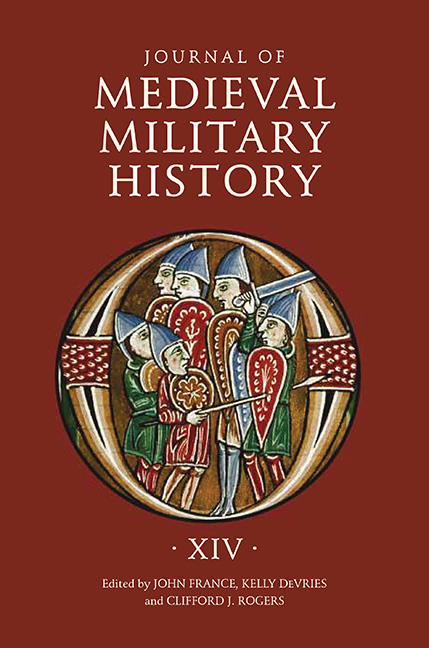Book contents
- Frontmatter
- Contents
- 1 Anglo-Norman Artillery in Narrative Histories, from the Reign of William I to the Minority of Henry III
- 2 Imperial Policy and Military Practice in the Plantagenet Dominions, c. 1337–c. 1453
- 3 The Parliament of the Crown of Aragon as Military Financier in the War of the Two Pedros
- 4 Chasing the Chimera in Spain: Edmund of Langley in Iberia, 1381/82
- 5 Note: A Medieval City under Threat Turns Its Coat, while Hedging Its Bets – Burgos Faces an Invasion in Spring 1366: Introduction and Translation
- 6 Medieval European Mercenaries in North Africa: The Value of Difference
- 7 Medieval Irregular Warfare, c. 1000–1300
- 8 Muslim Responses to Western Intervention: A Comparative Study of the Crusades and Post-2003 Iraq
- 9 “New Wars” and Medieval Warfare: Some Terminological Considerations
- 10 Friend or Foe? The Catalan Company as Proxy Actors in the Aegean and Asia Minor Vacuum
- List of Contributors
- Journal of Medieval Military History
- De Re Militari and the Journal of Medieval Military History
8 - Muslim Responses to Western Intervention: A Comparative Study of the Crusades and Post-2003 Iraq
Published online by Cambridge University Press: 12 September 2017
- Frontmatter
- Contents
- 1 Anglo-Norman Artillery in Narrative Histories, from the Reign of William I to the Minority of Henry III
- 2 Imperial Policy and Military Practice in the Plantagenet Dominions, c. 1337–c. 1453
- 3 The Parliament of the Crown of Aragon as Military Financier in the War of the Two Pedros
- 4 Chasing the Chimera in Spain: Edmund of Langley in Iberia, 1381/82
- 5 Note: A Medieval City under Threat Turns Its Coat, while Hedging Its Bets – Burgos Faces an Invasion in Spring 1366: Introduction and Translation
- 6 Medieval European Mercenaries in North Africa: The Value of Difference
- 7 Medieval Irregular Warfare, c. 1000–1300
- 8 Muslim Responses to Western Intervention: A Comparative Study of the Crusades and Post-2003 Iraq
- 9 “New Wars” and Medieval Warfare: Some Terminological Considerations
- 10 Friend or Foe? The Catalan Company as Proxy Actors in the Aegean and Asia Minor Vacuum
- List of Contributors
- Journal of Medieval Military History
- De Re Militari and the Journal of Medieval Military History
Summary
In recent years, considerable attention has been paid to various groups within conflicts that can be described as proxies or irregulars or, to use a term often employed within academic studies, “violent non-state actors” (VNSAs). One reason for this increased focus is the growing number of VNSAs in modern conflicts. More important factors, however, seem to be the growing influence and widening geographical reach of VNSAs and the increasing use of various asymmetrical forms of warfare that challenge existing preconceptions of both the nature of warfare and the legal frameworks surrounding definitions of conflict. This change in approach has been demonstrated most clearly, and to the greatest extent so far, by various Islamist groups, particularly al-Qaeda and, most recently, ISIS, through their global networks, their attacks on cities around the world, and their use of digital media to reach a global audience.
Yet despite their increase in significance and numbers in the contemporary world, and the consequent increased focus on them in current scholarship, VNSAs have always existed, and have been active throughout history, in all regions of the world. Examples include those primarily interested in profit, such as pirates and bandits, or those attempting to realize more political goals, such as the Maccabees or Hereward the Wake. Unsurprisingly, such actors also appear in the annals of Islamic history; as well as al-Qaeda, ISIS, and various other modern Islamist groups, such forces include the Barbary corsairs of the early modern period, the Anatolian frontier ghāzī warriors of the thirteenth and fourteenth centuries,
and the various jihad warriors who fought on the Arab–Byzantine frontier in the Umayyad and early ʿAbbāsid periods. Of course, these were operating before the Westphalian “nation-state” idea had been developed, and so were not VNSAs in the same sense that the term is used today. However, even before 1648 there was the idea that violence needed to be legitimated by the “state,” even though this was not the “state” as we understand it today; for example, the codification of the rules on jihad during the ʿAbbāsid period was, to a large extent, a response to individual Muslims carrying out raids on Byzantine territory that upset the balance of power between the two sides and interfered with and disrupted the caliphate's relations with Byzantium.
- Type
- Chapter
- Information
- Journal of Medieval Military HistoryVolume XIV, pp. 133 - 148Publisher: Boydell & BrewerPrint publication year: 2016



